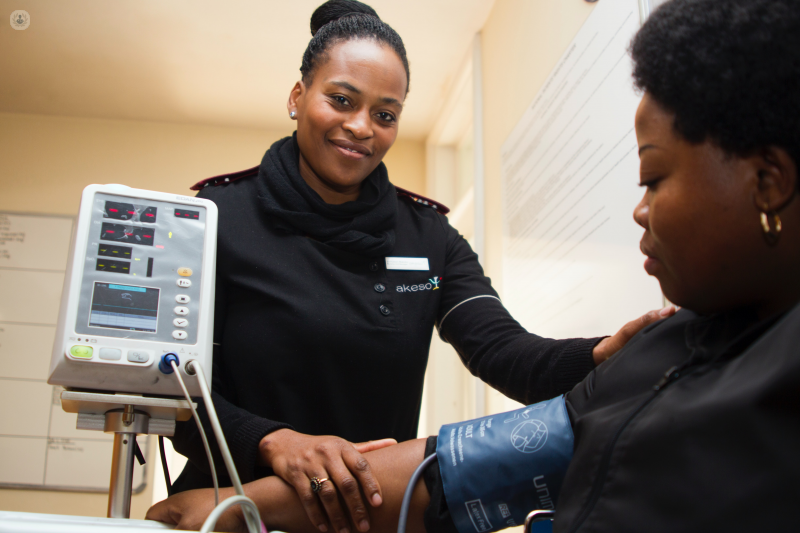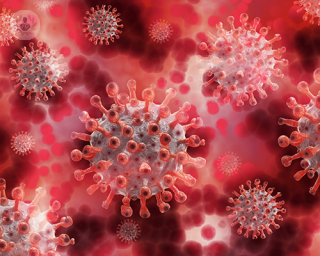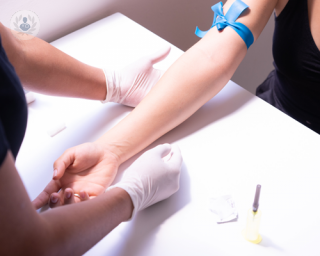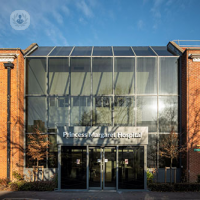What is vascular disease?
Vascular disease is any abnormal condition in the blood vessels (veins and arteries). Blood vessels are used to circulate blood throughout the body and problems along this vast network can cause death or severe disability.
Vascular diseases outside of the heart can become apparent anywhere.

What are the different types of vascular disease?
The more common vascular diseases are, peripheral arterial disease (PAD), stroke, carotid artery disease (CAD), abdominal aortic aneurysm (AAA), arteriovenous malformation (AVM), pulmonary embolism (blood clots), critical limb-threatening ischemia (CLTI), chronic venous insufficiency (CVI), deep vein thrombosis (DVT), and varicose veins.
With the increase in obesity and Type II diabetes as the population ages, vascular diseases are becoming more widespread. PAD can occur in anyone at any time, it affects men and women equally.
Atherosclerosis can begin in teenage years . Vascular disease often occurs at sites of turbulent blood flow, for example, when the blood flow in the arteries changes direction abruptly.
What are the causes of vascular disease?
The causes of vascular disease depend on the specific vascular disease.
Causes can include:
- genetics
- heart diseases such as high blood pressure and high cholesterol.
- infection
- injury
- medicines, including hormones
Sometimes the cause is unknown.
Can vascular diseases be prevented?
There are preventative steps you can take against vascular diseases:
- Make healthy lifestyle changes, such as getting more exercise and eating a heart-healthy diet.
- Don't smoke or quit smoking if you do.
- Ensure that you check cholesterol and blood pressure often.
- Control your blood sugar and diabetes.
- Try not to stand or sit for long periods of time. If you sit down all day for work, try getting up and moving around every hour or so. If you traveling on a long trip, you can also regularly stretch your legs and wear compression stockings.
How are vascular diseases treated?
The treatment depends on the vascular disease and how severe it is. Types of treatments for vascular diseases include
- Lifestyle changes. This can include getting more exercise or eating a healthier diet.
- Medicines, such as blood thinners, blood pressure medicines, clot-dissolving drugs, cholesterol medicines. In some cases, a catheter can be used to to send medicine directly to a blood vessel.
- Non-surgical procedures, such as stenting, angioplasty and vein ablation may be used.
- Surgery.
Vascular disease
Mr Ed Sideso - Vascular surgery
Created on: 11-13-2012
Updated on: 04-20-2023
Edited by: Jay Staniland
What is vascular disease?
Vascular disease is any abnormal condition in the blood vessels (veins and arteries). Blood vessels are used to circulate blood throughout the body and problems along this vast network can cause death or severe disability.
Vascular diseases outside of the heart can become apparent anywhere.

What are the different types of vascular disease?
The more common vascular diseases are, peripheral arterial disease (PAD), stroke, carotid artery disease (CAD), abdominal aortic aneurysm (AAA), arteriovenous malformation (AVM), pulmonary embolism (blood clots), critical limb-threatening ischemia (CLTI), chronic venous insufficiency (CVI), deep vein thrombosis (DVT), and varicose veins.
With the increase in obesity and Type II diabetes as the population ages, vascular diseases are becoming more widespread. PAD can occur in anyone at any time, it affects men and women equally.
Atherosclerosis can begin in teenage years . Vascular disease often occurs at sites of turbulent blood flow, for example, when the blood flow in the arteries changes direction abruptly.
What are the causes of vascular disease?
The causes of vascular disease depend on the specific vascular disease.
Causes can include:
- genetics
- heart diseases such as high blood pressure and high cholesterol.
- infection
- injury
- medicines, including hormones
Sometimes the cause is unknown.
Can vascular diseases be prevented?
There are preventative steps you can take against vascular diseases:
- Make healthy lifestyle changes, such as getting more exercise and eating a heart-healthy diet.
- Don't smoke or quit smoking if you do.
- Ensure that you check cholesterol and blood pressure often.
- Control your blood sugar and diabetes.
- Try not to stand or sit for long periods of time. If you sit down all day for work, try getting up and moving around every hour or so. If you traveling on a long trip, you can also regularly stretch your legs and wear compression stockings.
How are vascular diseases treated?
The treatment depends on the vascular disease and how severe it is. Types of treatments for vascular diseases include
- Lifestyle changes. This can include getting more exercise or eating a healthier diet.
- Medicines, such as blood thinners, blood pressure medicines, clot-dissolving drugs, cholesterol medicines. In some cases, a catheter can be used to to send medicine directly to a blood vessel.
- Non-surgical procedures, such as stenting, angioplasty and vein ablation may be used.
- Surgery.


Top safety tips for vascular patients: COVID-19 is a deadly vascular disease
By Mr Muhammad Asad Rahi
2024-11-21
Discover how COVID-19 affects vascular disease patients and the risks of a COVID blood clot. Mr Asad Rahi also provides top tips for patients with vascular issues. See more


How exactly is a cholesterol level test performed?
By Dr Rajesh Chelliah
2024-11-21
Cholesterol is a fatty, wax-like substance that is found naturally in the blood. Too much cholesterol, however, can pose a health risk and increase your chances of heart disease. In this article, esteemed consultant cardiologist Dr Rajesh Chelliah talks about the importance of cholesterol level testing. Dr Chelliah, who treats patients in Leicester and Nottingham, outlines what a cholesterol test entails and what to do if your test results are high. See more


Pelvic congestion syndrome: Don’t suffer in silence
By Professor Mark Whiteley
2024-11-20
In this informative article, celebrated vascular surgeon Professor Mark Whiteley expertly explains the most common causes of pelvic congestion syndrome and details how it can be treated. See more


Anti-VEGF agents: indications and current options
By Mr Hadi Zambarakji
2024-11-20
Anti-VEGF agents are used in order to treat a number of eye conditions. Highly regarded consultant opthalmologist Mr Hadi Zambarakji explains everything you need to know about these agents, including the differences between each anti-VEGF agent, how they are injected and associated complications. See more
Experts in Vascular disease
-
Mr Tom Browne
SurgeryExpert in:
- Vascular disease
- Varicose veins
- Aortic aneurysms
- Laparoscopic hernia surgery
- Carotid Surgery
-
Mr Ed Sideso
Vascular surgeryExpert in:
- Varicose veins surgery
- Aortic aneurysms
- Aortic valve replacement
- Vascular disease
- Diabetic foot
- Spider veins (thread veins)
-
Mr Alastair Lewis
Vascular surgeryExpert in:
- Endovenous laser treatment (EVLA)
- Foam sclerotherapy
- Spider veins (thread veins)
- Varicose veins
- Radiofrequency ablation (RFA)
- Vascular disease
-
Dr Andrew Coutinho
NephrologyExpert in:
- Chronic kidney disease
- Hypertension (high blood pressure)
- Acute kidney injury (AKI)
- Vascular disease
- Kidney transplantation
- Nephropathy (Kidney disease)
- See all

The Princess Margaret Hospital - part of Circle Health Group
The Princess Margaret Hospital - part of Circle Health Group
Osborne Rd, Windsor SL4 3SJ
No existe teléfono en el centro.
By using the telephone number provided by TOP DOCTORS, you automatically agree to let us use your phone number for statistical and commercial purposes. For further information, read our Privacy Policy
Top Doctors

UK Vein Clinic
UK Vein Clinic
150 Harley St
No existe teléfono en el centro.
By using the telephone number provided by TOP DOCTORS, you automatically agree to let us use your phone number for statistical and commercial purposes. For further information, read our Privacy Policy
Top Doctors
-
The Princess Margaret Hospital - part of Circle Health Group
Osborne Rd, Windsor SL4 3SJ, WindsorExpert in:
- Brachytherapy
- Cardiology
- General Surgery
- Orthopaedic surgery
- Robotic Surgery
- Dermatology
-
UK Vein Clinic
150 Harley St, W1G Marylebone LondonExpert in:
- Radiofrequency ablation (RFA)
- Thread veins
- Endovenous laser treatment (EVLA)
- Foam sclerotherapy
- Varicose veins
- Most viewed diseases, medical tests, and treatments
- Autoimmune diseases
- Joint pain
- Nutrition
- Weight loss injections
- Nipple discharge
- Abdominal pain
- Endovenous laser treatment (EVLA)
- Minimal access surgery (keyhole surgery)
- Head and neck cancer
- Neck lump




